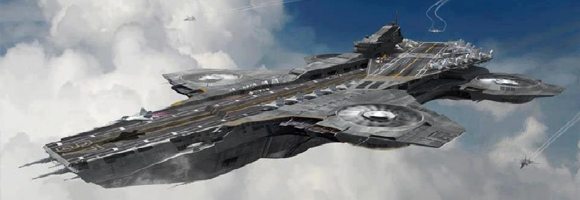space aircraft carriers

↑Christopher Weuve, among other things a naval analyst and science fiction geek, ↑talked with Michael Peck of Foreign Policy about the dialectics between naval warfare and space warfare as depicted in science fiction. When Peck asked, “Has sci-fi affected the way that our navies conduct warfare?” Weuve answered:
This is a question that I occasionally think about. Many people point to the development of the shipboard Combat Information Center in World War II as being inspired by E.E. Doc Smith’s Lensman novels from the 1940s [Smith 1950 [1937]]. Smith realized that with hundreds of ships over huge expanses, the mere act of coordinating them was problematic. I think there is a synergistic effect. I also know a number of naval officers who have admitted to me that the reason they joined the Navy was because Starfleet Command wasn’t hiring.
That last sentence reminded me of Karl Taro Greenfeld’s main informant concerning the Bosozoku:
He had seen the Midnight Angels around and was dazzled by their loud motorcycles, gaudy cars, and kamikaze outfits; as they rode Arakawa Ward they reminded him of the kind of delinquents who were the heros in Akira [Otomo 1982-1990], his favorite comic book. So Tats[uhiro Nobutani] joined. (Greenfeld 1994: 24)
So, Appadurai is more right than ever when he insists that fictional material in our times offers a multitude of inspirations for biographies. And I insist that science fiction is most crucial in this. The whole interview with Chris Weuve is very worthwhile; here is his closing paragraph:
Fiction does not replace policy analysis. But science fiction is the literature of “what if?” Not just “what if X happens?” but also “what if we continue what we’re doing?” In that way, science fiction can inform policy making directly, and it can inform those who build scenarios for wargames and exercises and the like. One of the great strengths of science fiction is that it allows you have a conversation about something that you otherwise couldn’t talk about because it’s too politically charged. It allows you to create the universe you need in order to have the conversation you want to have. Battlestar Galactica spent a lot of time talking about the war in Iraq. There were lots of things on that show about how you treat prisoners. They never came out and said that directly. They didn’t have to. At the Naval War College, one of the core courses on strategy and policy had a section on the Peloponnesian War. It was added to the curriculum in the mid-1970s because the Vietnam War was too close, so they couldn’t talk about it, except by going back to 400 BC.

